Considering History: The Presidency and Impeachment of Andrew Johnson
This column by American studies professor Ben Railton explores the connections between America’s past and present.
One hundred fifty years ago, Andrew Johnson became the first president of the United States to be impeached.
In 1864, facing a stiff challenge to his reelection campaign from Democratic nominee (and former Union general) George McClellan, President Abraham Lincoln decided to replace his current vice president, Hannibal Hamlin, on the ticket with a Democrat, Tennessee Senator and military governor Andrew Johnson. This choice allowed Lincoln and Johnson to run under the banner of the newly created National Union Party, emphasizing opposition to the Confederacy across the nation (and especially in contested border states like Tennessee). It was a pragmatic and clever strategic move, and likely contributed greatly to Lincoln’s eventual easy victory over McClellan in November 1864.
Yet as early as inauguration day, March 4, 1865, there were indications that Lincoln’s practical decision might have also been a mistake. Johnson may have been drunk at the inauguration (he had been witnessed drinking heavily at a party the night before and asked Hannibal Hamlin for two additional drinks just before the inauguration began), and in any case delivered a rambling, belligerent speech that was hastily cut off when Hamlin swore him in as the new vice president. And this ominous opening foreshadowed what would become, after Lincoln’s tragic April 14th assassination, one of the most divisive and destructive presidencies in American history.
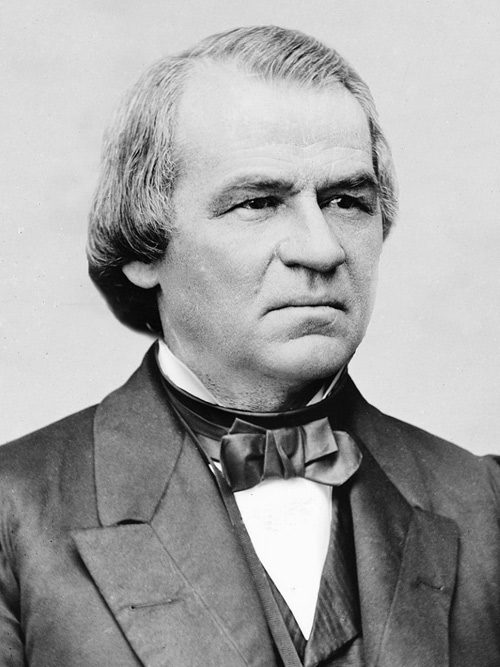
Johnson continued his pattern of belligerent and bellicose public statements as President. When supporters came to the White House in February 1866 for a Washington’s Birthday celebration, Johnson addressed them in another long, rambling speech, highlighting his own accomplishments more than 200 times and attacking “men still opposed to the Union” who were “as much laboring to pervert or destroy [fundamental American principles] as were the men who fought against us.” When pressed by audience members, he named Congressman Thaddeus Stevens and Senator Charles Sumner (among others) as these enemies. In August and September of that year he would embark on a national speaking tour unprecedented for a sitting president; known as the “Swing Around the Circle,” the tour featured more than twenty rallies in which Johnson continued to attack Congressional “enemies” and make the case for his divisive Presidential Reconstruction policies ahead of the November midterm elections.
Those extreme Presidential Reconstruction policies truly defined Johnson’s divisive and disastrous administration, both on their own terms and in contrast to what might have been the case had Lincoln not been killed. Although Johnson had been perceived as a moderate on issues of slavery and sectionalism prior to and during the Civil War, as president he revealed himself to be both a staunch ally of the neo-Confederate South and a virulent white supremacist. Among his earliest presidential proclamations, Johnson first recognized a provisional Virginia government that was practicing policies of forgiveness toward ex-Confederates and then provided federal amnesty for nearly all ex-rebels. He went on to support additional amnesty policies such as one that allowed ex-Confederates (such as former vice president of the Confederacy Alexander Stephens) to serve in Congress; since Johnson’s administration likewise opposed proposals for African American voting rights, nearly all of the Southerners elected to Congress in these early post-war years were former Confederates.
Johnson’s opposition to post-war rights for African Americans went far beyond opposing suffrage proposals. In February 1866 he vetoed a bill that would have extended the vital operations of the Freedmen’s Bureau beyond the agency’s scheduled 1867 abolition, claiming that the law “would not be consistent with the public welfare.” In March of the same year he vetoed the groundbreaking Civil Rights Bill, arguing in his veto message that “the distinction of race and color is by the bill made to operate in favor of the colored against the white race.” Johnson also opposed the 14th Amendment and campaigned extensively (if unsuccessfully) against its ratification by the states, solidifying his administration’s overall hostility to nearly all Reconstruction measures that focused on civil rights rather than reintegrating the Confederate South into the nation as smoothly as possible.
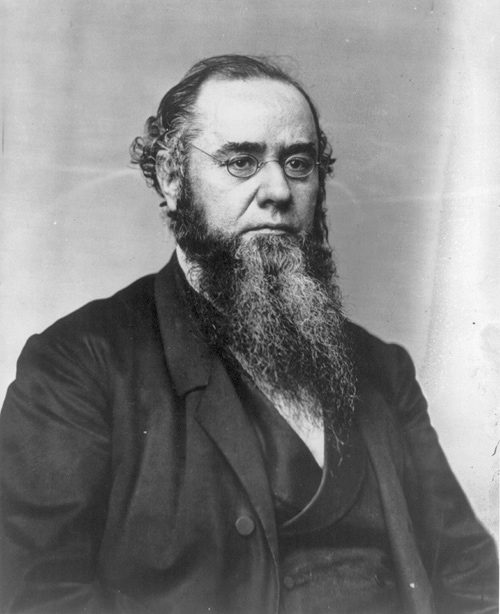
All those conflicts contributed to Johnson’s February 1868 impeachment by the House of Representatives, but it was his blatant, authoritarian violation of a specific law that directly precipitated the Congressional action. During his 1866 speaking tour, Johnson had pledged to fire Cabinet secretaries who did not agree with him (especially those who had been appointed under Lincoln), and in March 1867 he vetoed the Tenure of Office Act, which required Senate approval for such firings; Congress overrode his veto and passed the act into law. Throughout that year Johnson battled with Secretary of War Edwin Stanton, a Lincoln appointee and advocate of Congressional Reconstruction, harsher treatment of former Confederates, and African American rights. In August, with Congress out of session and unable to approve any Cabinet actions, Johnson demanded Stanton’s resignation; when Stanton refused, Johnson suspended him and replaced him with General of the Army Ulysses S. Grant. The conflict continued for many months, and when Johnson permanently dismissed Stanton in February 1868 without gaining Senate approval as required by law, the House of Representatives voted 128 to 47 to impeach.
After a three-month trial in the Senate, featuring so much wheeling and dealing that Johnson and his allies would later be investigated by Representative Benjamin Butler for bribery, the Senate on May 16, 1868, fell a single vote short of the two-thirds majority necessary to convict the president. Johnson would complete the remainder of his term, but as a deeply unpopular president; even his own Democratic Party denied him the 1868 presidential nomination in favor of former New York Governor Horatio Seymour (who would lose to the Republican nominee Ulysses S. Grant). On Christmas Day, 1868, Johnson took advantage of one of his last opportunities to further his neo-Confederate and white supremacist agendas, issuing a blanket amnesty that covered all former Confederates including the Confederate President Jefferson Davis.
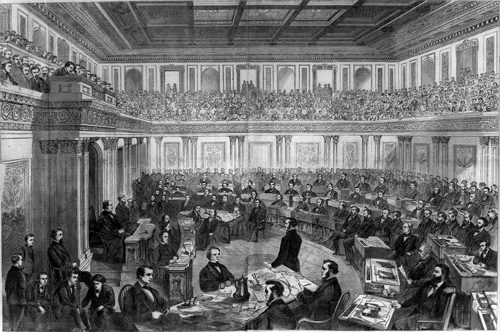
Johnson’s political career did not quite end with Grant’s election, as he made a successful run for a Tennessee Senate seat (at that time still decided by the state legislature) in early 1875. He would only serve for a few months before dying unexpectedly of a stroke in July, but during that time expressed his neo-Confederate views one last time (his only official remarks during his brief Senate term), criticizing Grant’s use of federal troops in Louisiana and asking, “How far off is military despotism?” One final belligerent and extreme remark from a president who remains one of the most divisive and destructive in American history.
News of the Week: The Circus Leaves Town, an Alligator Visits, and We Have a New President
Goodbye Ringling Brothers
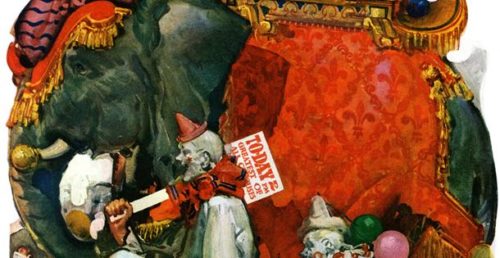
I went to the Ringling Brothers and Barnum & Bailey Circus once in my life, during a class trip in the late ’70s, and the only memory I have of it is of my friend Pete irritating the vendors. Our teachers specifically told us that if we wanted some tonic (which is what we in New England used to call soft drinks, and maybe some still do), we had to say “pop.” Of course, when you tell middle-school kids to do something, you can pretty much guarantee they’ll do the opposite, which is what Pete did. He told the vendor he wanted tonic, and when the vendor said to him “we call it pop,” he smirked and said, “well, I want tonic!”
The famed circus announced this week that it’s closing after a history that stretches back 146 years. Here’s a great Post Perspective on Ringling Brothers from David G. Wittels and Jeff Nilsson.
That’s Not an Alligator, That’s a Dinosaur
This looks like one of those fake viral videos that someone makes and we all believe it until it’s debunked a day later, but it’s 100% real. I have no idea why those people are just standing there filming it.
House of Wax
What is President Abraham Lincoln worth? $8,500.
I’m talking about his wax likeness, which went for that amount this week during an auction of wax presidents at the Hall of Presidents and First Ladies Museum in Gettysburg, Pennsylvania (the museum closed in November). Check out the pics of former presidents and first ladies being hauled off in this USA Today article. Bess Wallace Truman and Mary Arthur McElroy look like they’re going to star in a weird remake of Thelma & Louise.
Lincoln was the top seller, by the way. The wax version of Theodore Roosevelt went for $8,000, and Jackie Kennedy went for only $550. Outgoing president Barack Obama brought in $2,000.
RIP Miguel Ferrer, William Peter Blatty, Gene Cernan, Dick Gautier, Tony Rosato, and Tommy Allsup
Miguel Ferrer was a veteran TV actor, known for everything from NCIS: LA and Crossing Jordan to Twin Peaks and Desperate Housewives. He also appeared in Magnum P.I., ER, Will & Grace, Lateline, the Bionic Woman reboot from 2007, and dozens of other live-action and animated shows. You also saw him in movies like Iron Man 3, Star Trek III: The Search for Spock, Robocop, Traffic, Mulan, and many more. He’ll appear in the new Twin Peaks series on Showtime in May.
Ferrer came from a talented family. His father was actor Jose Ferrer, his mother was Rosemary Clooney, and his cousin is George Clooney. Ferrer passed away yesterday after a battle with cancer. He was 61.
I had no idea that William Peter Blatty had written the screenplays for the Pink Panther film A Shot in the Dark and What Did You Do in the War, Daddy? Of course, he’s most famous for writing the novel The Exorcist, which spawned several movies and a current TV series. Blatty passed away at the age of 89.
Gene Cernan was the last man to walk on the moon (but hopefully not the last, period). He did it during the Apollo 17 mission in 1972. He later went on to help develop the Apollo-Soyuz space mission. Cernan died on Monday at the age of 82.
You might know Dick Gautier from a million things, including the original production of Bye Bye Birdie in 1960 and TV shows like When Things Were Rotten, Mr. Terrific, Charlie’s Angels, The Mary Tyler Moore Show, and Love, American Style, as well as dozens of cartoons. But he is probably best remembered by classic TV fans as Hymie the Robot on Get Smart, even though he only appeared in six episodes of the series. Gautier passed away at the age of 85.
Tony Rosato was a comedian and actor who appeared on both SCTV and Saturday Night Live, as well as providing the voice of Luigi on the Super Mario Bros. TV series. He passed away of a heart attack at the age of 62.
Guitarist Tommy Allsup’s life was saved because of the flip of a coin. He was going to get on the plane that carried Buddy Holly and other musicians on February 3, 1959, but had to take a bus when he lost a coin toss to Richie Valens. Flying in snow, the plane crashed, killing everyone on board. Allsup went on to work with people like The Ventures, Roy Orbison, and Willie Nelson and produced several albums for Asleep at the Wheel. He passed away at the age of 85.
In brighter news, Betty White turned 95 this week!
Winter Books
In our current issue, we pick some great reads for curling up on the couch with on these cold winter nights, including J.P. Delaney’s thriller The Girl Before, Kevin R.C. Gutzman’s Thomas Jefferson — Revolutionary, Christopher Bohjalian’s The Sleepwalker, Douglas Preston’s The Lost City of the Monkey God, and Portraits of Courage, which showcases the paintings of George W. Bush. He’s actually quite good!
To that list I would add Please Don’t Eat the Daisies. Yes, I know it was released in 1957, but I’m just now catching up with it (I’m a little behind). It’s a really great read. It’s a book of humorous essays on family and work life by Jean Kerr (you may have seen the popular Doris Day movie), who wrote several pieces for The Saturday Evening Post, including “Children Really Are Not People,” which is included in the book (under the title “Where Did You Put the Aspirin?”). It’s out of print (a travesty), but you can search for a used copy online at AbeBooks.
This Week in History
Andy Rooney Born (January 14, 1919)
The acclaimed writer and 60 Minutes essayist talked to The Saturday Evening Post in 1984 about his career, how he handles his fame, and how woodworking is like writing.
Ronald Reagan Becomes Oldest President (January 20, 1981)
The 40th Commander-in-chief — a famous midlife career changer — was 69 years old when he took the oath of office. Donald Trump becomes our oldest president elected at the age of 70 when he puts his hand on the Lincoln Bible today.
USS Nautilus, First Nuclear-Powered Sub, Launches (January 21, 1954)
The submarine was decommissioned in 1980 after 26 years of service.
This Week in Saturday Evening Post History: Benjamin Franklin’s Birthday
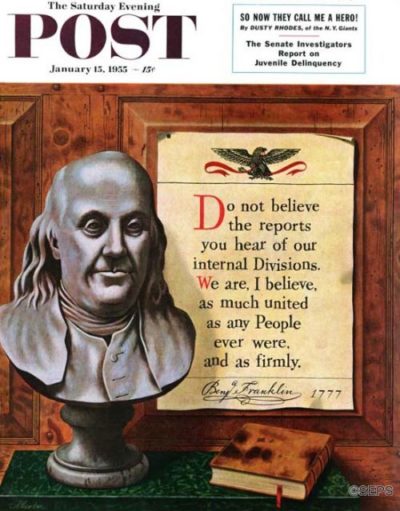
The talented Founding Father was born on January 17, 1706, and he’s partly responsible for the existence of The Saturday Evening Post.
Feeding the Presidents
By the time you read this, we will have a new president. I thought it would be good to link to some recipes that past presidents enjoyed.
Here’s George Washington’s Morning Corn Cakes, Dwight D. Eisenhower’s Vegetable Soup, Lady Bird Johnson’s Pedernales River Chili, and for dessert, White House pastry chef Bill Yosses’ recipe for Apple Pie, a favorite of the Obama family.
I mentioned above that Donald Trump would be sworn in today with his hand on the Lincoln Bible. Did you know that Lincoln loved gingerbread men? He did! He even mentioned it at the Lincoln-Douglas debates. Here’s the recipe.
As for Trump, we don’t know what his favorite meals will be in the White House, so until we learn more, we’ll just have to Make Vegetables Great Again.
Next Week’s Holidays and Events
National Handwriting Day (January 23)
Here’s what I think you should do next week: buy some stationery and some stamps and write an actual letter to a friend or family member, or even a company you’re mad at for some reason. It doesn’t matter, just write something. In this day and age of texting and short social media posts, you’ll be amazed at how good it feels, and the person who receives the letter will be shocked and happy. Handwriting still matters, no matter what some people may say.
Chinese New Year (January 28)
The Year of the Rooster begins in 2017, and the celebration lasts until February 15, 2018.